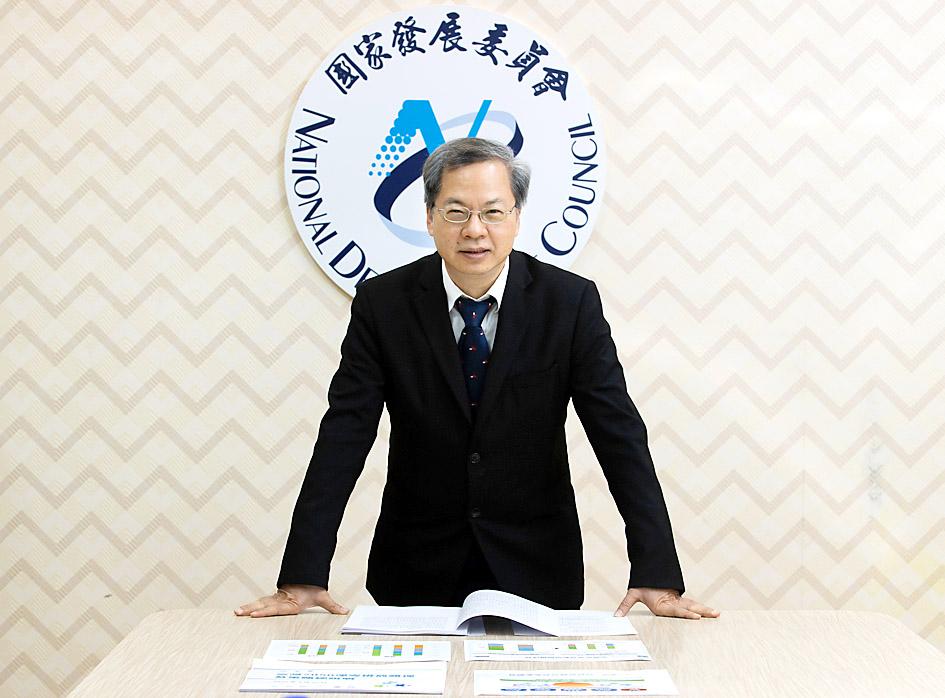Taiwan would continue to enhance its role in global supply chains in a bid to join the US-led Indo-Pacific Economic Framework (IPEF), National Development Council Minister Kung Ming-hsin (龔明鑫) said.
In an interview with Voice of America, Kung said that global supply chains have undergone a restructuring amid US-China trade tensions and the COVID-19 pandemic.
Many Taiwanese companies have remained resilient during the restructuring, Kung said, adding that they benefited from the changes and ensured Taiwan’s economic growth.

Photo: CNA
The nation’s economy last year grew 6.57 percent and is expected to grow 3.91 percent this year, he said.
Taiwanese firms have been moving their production from China to Southeast Asia, North America, and central and eastern Europe, he said, adding that the changes are expected to bolster global supply chains.
Taiwan has become a role model in the global supply chain, and it will continue to bolster the resilience of its investors and strengthen their role in global supply chains, Kung said.
Taiwan is qualified to join the IPEF, he added.
The White House on May 22 announced that Taiwan had not been invited to join the IPEF, which was unveiled by US President Joe Biden a day later during his visit to Asia.
In the first round, 13 economies accounting for about 40 percent of the world’s GDP joined the trade pact: the US, Japan, Australia, New Zealand, Brunei, India, Indonesia, South Korea, Malaysia, the Philippines, Singapore, Thailand and Vietnam.
US National Security Adviser Jake Sullivan said Washington was looking to deepen its economic relationship with Taipei, in particular on “high-technology issues, including on semiconductors and supply chains.”
The IPEF focuses on four major themes: fair and resilient trade, supply chain resilience, infrastructure, clean energy and decarbonization, and tax and anti-corruption, with further details expected later.
Despite a lack of detail, Kung said the IPEF expresses the US’ intention to return to Asia by mapping out a strategy in the Indo-Pacific region.
Taiwan has already been working to improve its performance in the four areas identified by the IPEF, he said.
Based on the IPEF’s themes, Taiwan would promote building smart cities, improve cross-border privacy and endeavor to achieve net-zero carbon emissions by 2025, he added.
However, the nation cannot develop supply chains and enter new markets on its own, Kung said.
It has to cooperate with other nations, which is why Taipei is keen to seek bilateral or multilateral cooperation in global trade, he said.
Taipei and Washington resumed talks under the Trade and Investment Framework Agreement mechanism last year after a five-year hiatus.
Both sides have also hosted digital economic forums, Kung said.
Taiwan has also begun conducting closer economic exchanges with central and eastern Europe, he said.

South Korea’s equity benchmark yesterday crossed a new milestone just a month after surpassing the once-unthinkable 5,000 mark as surging global memory demand powers the country’s biggest chipmakers. The KOSPI advanced as much as 2.6 percent to a record 6,123, with Samsung Electronics Co and SK Hynix Inc each gaining more than 2 percent. With the benchmark now up 45 percent this year, South Korea’s stock market capitalization has also moved past France’s, following last month’s overtaking of Germany’s. Long overlooked by foreign funds, despite being undervalued, South Korean stocks have now emerged as clear winners in the global market. The so-called “artificial intelligence

NEW IDENTITY: Known for its software, India has expanded into hardware, with its semiconductor industry growing from US$38bn in 2023 to US$45bn to US$50bn India on Saturday inaugurated its first semiconductor assembly and test facility, a milestone in the government’s push to reduce dependence on foreign chipmakers and stake a claim in a sector dominated by China. Indian Prime Minister Narendra Modi opened US firm Micron Technology Inc’s semiconductor assembly, test and packaging unit in his home state of Gujarat, hailing the “dawn of a new era” for India’s technology ambitions. “When young Indians look back in the future, they will see this decade as the turning point in our tech future,” Modi told the event, which was broadcast on his YouTube channel. The plant would convert

‘SEISMIC SHIFT’: The researcher forecast there would be about 1.1 billion mobile shipments this year, down from 1.26 billion the prior year and erasing years of gains The global smartphone market is expected to contract 12.9 percent this year due to the unprecedented memorychip shortage, marking “a crisis like no other,” researcher International Data Corp (IDC) said. The new forecast, a dramatic revision down from earlier estimates, gives the latest accounting of the ongoing memory crunch that is affecting every corner of the electronics industry. The demand for advanced memory to power artificial intelligence (AI) tasks has drained global supply until well into next year and jeopardizes the business model of many smartphone makers. IDC forecast about 1.1 billion mobile shipments this year, down from 1.26 billion the prior

People stand in a Pokemon store in Tokyo on Thursday. One of the world highest-grossing franchises is celebrated its 30th anniversary yesterday.